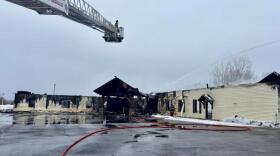The response to arming teachers as a way to combat school shootings sounds like any other debate about guns. Proponents say it's a practical way to stop shooters, while opponents argue that it will actually increase the risk of danger. But among some educators, the debate doesn't fall along those same lines.
On a cold Saturday afternoon on top of the Mercy Mountain property in Lafayette, Matt Mallory, an army veteran and owner of a firearms training company, is teaching a concealed carry course.
"When I say threat you're going to press out," Mallory instructs. "Squeeze the trigger."
Mallory is offering his firearms training free of charge to teachers and school personnel if the district gives them permission to carry in the building. He says it will make these criminals think twice before attacking a school, and give teachers a way to fight back.
"We’re not saying run out into the hallway and chase the active killer down. No. We’re saying if that active killer is actively coming into that room and they kick the door in, stop that threat," Mallory said. "It’s right there in front of you. What else are you going to do? Hide behind a desk and play dead? It doesn't work."
Mallory says arming teachers is the first step to putting an end to school shootings. But at a roundtable of students and faculty from SUNY Oswego's School of Education, the idea was quickly dismissed.
Joanne O’Toole, a former teacher and the associate director of SUNY Oswego's curriculum and instruction department, says what it would stop is people from entering the profession.
"It’s nowhere in our standards, it’s nowhere in our code of ethics, it’s nowhere in our preparation," O'Toole said. "I’ve been in the profession for 30 years and if somebody told me that either I had to carry a weapon or my colleagues might be carrying weapons, I don’t know if I would have become a teacher."
Marcia Burrell, director of the curriculum and instruction department, says arming teachers more than changes the profession - it transforms the school environment.
"We're saying if that active killer is actively coming into that room and they kick the door in, stop that threat," said Matt Mallory.
"I actually have this idea that some of this is about perception," Burrell said. "If you build a fortress, then that fortress is going to be attacked. And maybe that’s radical, but the fact is schools are not a place where we have to worry about whether or not I'm going to be shot. It's a place for learning, building our community."
Burrell, O’Toole and Katie Even, a graduate student in SUNY Oswego's School of Education, side with thousands of teachers who have taken to social media to call for arming them with psychologists and counselors, not weapons.
"The answer isn’t stopping people from coming into the school, it’s making people better so they don’t grow up to want to do these acts," Even said. "We can fix it from the roots up."
Melody Williams, a sixth grade teacher at Lyons Central School District in Wayne County, does think arming teachers could save lives and would make her feel safer if that teacher is a former police officer or veteran.
"If you have really highly qualified people – and by highly qualified I mean ex-military, ex-police where they have been trained how to use a weapon only when it’s absolutely necessary to protect other people and they’ve been put in stressful situations and proven they can handle that and use a weapon only the way it should be – that allowing them to carry a gun is in our kids’ best interest," Williams said. "But outside those situations I think it could be dangerous."
However, Williams does not think it's the solution. Like Even, she thinks the way to stop this issue is prevention.
"We see the students who have red flags," She said. "We know that they need help. We know that they need counseling. We know that they need outlets and interventions and you can only do so much as a classroom teacher, and you can only do so much as an administration. I think everybody wants to help these kids, but we’re underfunded in that area to get the kids the real help that they need to eliminate them from being a risk later on."
"I've been in the profession for 30 years and if somebody told me that either I had to carry a weapon or my colleagues might be carrying weapons, I don't know if I would have become a teacher," said Joanne O'Toole, associate director of SUNY Oswego's curriculum and instruction department.
A 2017 survey of New York state school superintendents found that nearly half of those who responded said they do not have the resources to help students with nonacademic needs, like mental health. And for the first time last year in the survey, it was identified as the top priority for new funding.
Congress did include more than $2 billion in new funding for mental health, training, and school safety efforts in its latest budget. And New York state lawmakers increased school funding by $1 billion in their budget. But some school advocacy organizations like the Alliance for a Quality Education (AQE) say state funding is not keeping up with inflation, leading many schools to place support services like counselors on the chopping block.
"If you cannot afford to provide both your basic supplies and school counselors, you’re going to choose to provide basic supplies in most cases," said AQE president Billy Easton. "So this budget, because it is just not enough money for high-need districts and overall, this is going to mean that many students don’t have those counselors and school workers they need."








